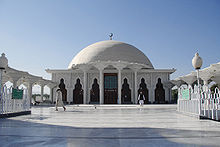Peshawar
Peshawar (Urdu پشاور Pēšāwar, Pashto پېښور; from Persian پیشاور, DMG Pīšāwar; English Peshawar; German historically Pastewka) [![]()
![]() peˈʃaːwɐɾ] is the capital of the Pakistani province of Khyber Pakhtunkhwa with about 1.970,000 inhabitants (as of 2017). Before the partition of British India, the city was called Purushapura or Pushpapura, derived from the Sanskrit,puruṣaḥ' = man,,pūḥ' (stem,pur-') = city, i.e. "city of men"; or Pushpapura, meaning "flower city", from Sanskrit,puṣpa(m)' = flower. Peshawar is situated at the eastern exit of the Chaiber Pass.
peˈʃaːwɐɾ] is the capital of the Pakistani province of Khyber Pakhtunkhwa with about 1.970,000 inhabitants (as of 2017). Before the partition of British India, the city was called Purushapura or Pushpapura, derived from the Sanskrit,puruṣaḥ' = man,,pūḥ' (stem,pur-') = city, i.e. "city of men"; or Pushpapura, meaning "flower city", from Sanskrit,puṣpa(m)' = flower. Peshawar is situated at the eastern exit of the Chaiber Pass.
Peshawar has several universities.
History
Peshawar was founded over 2,000 years ago by the kings of Gandhara and has been a trading centre between the Indian subcontinent, Afghanistan and Central Asia for centuries. The city was the eastern capital of the Kushan Empire under Kanishka. This king had the largest stupa built here at that time, about 120 m high, by the master builder Agishala. Marco Polo visited the city in 1275.
In 1530, Babur, the founder of the Mughal Empire, built a fort. Later, the construction of the Delhi-Kabul road and the laying out of gardens under Sher Khan Suri ushered in a veritable boom in Peshawar.
In 1834, the Sikhs under Maharaja Ranjit Singh invaded Peshawar and set fire to large parts of the city. For over 30 years, the Sikhs ruled Peshawar. After the disintegration of the Sikh kingdom due to disputes in the Maharaja's family, the British took control of the city. During this period, the city was the capital of the North West Frontier and one of the largest garrisons of the British Indian Army.
Before September 2001, Osama bin Laden maintained a guest house here, where his terror fighters, among others, were accommodated. According to Saudi dissident Saad Al-Faqih, the guest list of this house is the origin of the term Al-Qaeda.
The majority of the inhabitants of Peshawar are Pashtuns. Pashtuns are an important population group in the Pakistani province of Khyber Pakhtunkhwa and the majority of the population in the tribal areas under the administration of the Pakistani central government. However, Pashtuns also live in Afghanistan, where they are the largest ethnic group.
On 19 April 2010, two bomb attacks were carried out in Peshawar; in the first, an eight-year-old boy was killed outside a school and at least ten people were injured; several hours later, a suicide bombing occurred in the Qissa Khwani market, where a demonstration by Jamaat-e-Islami supporters was taking place, killing at least 25 people.
On June 8, 2012, 19 people were killed and 20 injured in a bomb attack on a bus carrying government employees on the Charsadda Road in Peshawar.
On 22 September 2013, at least 61 people were killed and over 120 injured in a suicide attack on the All Saints Protestant Church in the city. In response to the attack, protests took place in Peshawar, Karachi, Lahore, Faisalabad and Multan; the protests in Karachi were sometimes violent.
On September 27, 2013, 19 people were killed and 44 injured in a bomb attack on a bus carrying government employees on the Charsadda Road in Peshawar.
On 29 September 2013, 33 people were killed and 75 injured in a bomb attack in Peshawar's Qissa Khwani near a police station.
On December 16, 2014, the Taliban murdered at least 141 people, most of them schoolchildren, in a terrorist attack on a school in Peshawar.
On September 2, 2016, several suicide bombers attempted to enter a Christian neighborhood in Peshawar but were stopped by security forces. Four attackers and one civilian were killed in the exchange of fire; three security forces and two civilian guards were injured.

Masjid-al-Zar'ouni (Zarghoni Mosque) in Peshawar
Population development
| Census Year | Population |
| 1972 | 272.697 |
| 1981 | 566.248 |
| 1998 | 988.055 |
| 2017 | 1.970.042 |
Search within the encyclopedia